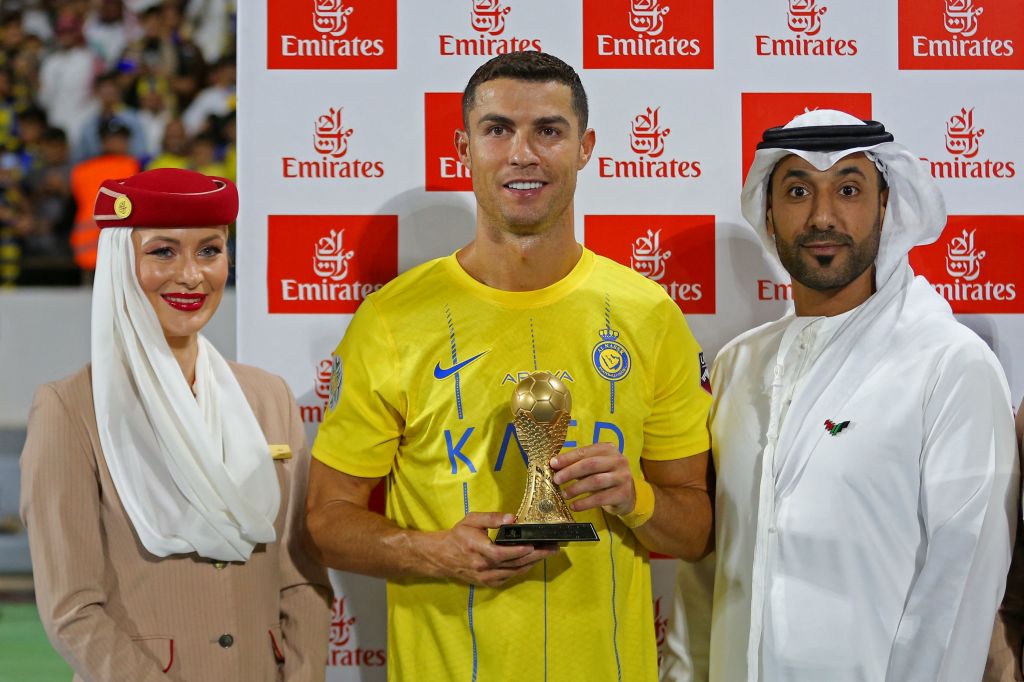
After months of courting big-name European soccer champions and signing them with eye-watering price tags, Saudi Arabia’s Pro League kicks off with its most star-studded and highly-anticipated season since its founding back in 1976.
This year’s inaugural game on Friday will see Saudi Arabia's Al-Ahli face off against Al-Hazm.
The kingdom has funneled hundreds of millions of dollars into attracting top European talent, including Cristiano Ronaldo, who joined Al Nassr last year as part of a €200 million ($219 million) per year package that makes him the world's highest paid athlete. Other top players that have recently joined Saudi teams include Karim Benzema in a $107 million deal with Al Ittihad, Sadio Mané in a $43.83 million deal with Al Nassr, and Riyad Mahrez with a $32 million deal with Al-Ahli. (Lionel Messi and Kylian Mbappé turned down even more staggering sums to join the Saudi league.)
The recruitment drive follows a deal that saw Saudi Arabia’s Public Investment Fund take ownership of the nation’s top four soccer clubs. The soccer league also announced that it has entered into a range of broadcast deals with as many as 130 global markets, excluding the U.S.
“I’ve worked in sport for 40 years and I’ve never seen a project as big, as ambitious and as determined to be a success,” Peter Hutton, who sits on the Pro League's board, told the BBC.
With all the money and talent being poured into Saudi soccer clubs, here's what to know.
Why is Saudi Arabia investing so much in soccer?
In 1994, Saudi Arabia qualified for the World Cup for the first time, a boon for the sport’s popularity in the kingdom. Saudi Arabia has since regularly qualified for the tournament and, when it comes to the Asian Champions League, has ranked fairly well in recent years. The decision to invest more in Saudi Arabia's most popular sport is logical, says Simon Chadwick, a professor of sport and geopolitical economy at France’s SKEMA Business School.
In 2015, the nation's de facto ruler, Crown Prince Mohammed bin Salman, or MBS, decided to privatize Saudi’s soccer clubs, which had previously relied on the government to pay off their debts. The move paved the way for increased sponsorship deals, merchandising, and ticket sales that Saudi officials hope will help diversify their oil-dependent economy.
“The ultimate ambition as a result of this privatization program is for Saudi Arabia's League and its clubs to start appearing in global rankings of the most commercially lucrative leagues and teams in the world,” Chadwick says.
To some degree, soccer is also being used as a tool to liberalize social mores in the ultra-conservative kingdom. 2018 marked the first time women could buy tickets to attend soccer matches, and in 2022, Saudi Arabia's national women’s team won its first ever international tournament against Pakistan.
Will non-Saudis tune into the Pro League?
With broadcasting deals across the globe, including a landmark one with British sports broadcaster DAZN, Saudi leaders are certainly hoping so.
Moqbel al-Zabni, the editor-in-chief of the Saudi capital’s ar-Riyadiyah newspaper, told Al Jazeera that officials want “the compass of professional football to point to the Middle East and the Arab world.”
But Chadwick and others have raised concerns about whether the league's approach is sustainable. “The big challenge for Saudi Arabia is to make sure that this isn't just a 2023 phenomenon and people are still watching, still listening, still engaging years later," he says, adding that the Chinese Super League followed a similar trajectory but failed to retain major fan interest over time.
The English Premier League, by far the world’s most popular league, established its profile organically over decades. The fact that these deals also target the world’s biggest stars, at the tail-end of their soccer years, raises further concerns about the sustainability of the approach.
“Unless there is an alternative model that Saudi Arabia can derive from its [soccer], then essentially for the foreseeable future, at least, it's going to be locked into signing these kinds of big name players,” Chadwick says.
Read More: Stunning Golf Merger Shows How Saudi Cash Could Change Sports
Is the big-money another sign of ‘sportswashing’?
Soccer is hardly the only sport that Saudi Arabia has poured billions of dollars into. The kingdom has spent $10 billion on players, teams, and leagues across soccer and golf, according to the Economist, with many accusing Saudi Arabia of “sportswashing” to burnish its reputation globally. The kingdom has come under growing criticism for its human rights record, including the murder of Saudi dissident Jamal Khashoggi at the Saudi consulate in Istanbul in 2018.
“Under Crown Prince Mohammed bin Salman, the Saudi government has spent billions of dollars investing in sport to deliberately mask the country’s egregious human rights record,” Joey Shea, a Saudi Arabia researcher at Human Rights Watch, tells TIME. “MBS has aggressively bankrolled and expanded investments in major sports to deflect criticism from rights abuses, while Saudi authorities have nimbly evaded accountability for Jamal Khashoggi’s murder and other terrible crimes,” she adds.
Others, however, see the increased attention on Saudi Arabia because of sport as an opportunity to lobby the kingdom to improve its rights record. For example, global condemnation over the deaths of migrant workers erecting infrastructure for the 2022 Qatar World Cup pushed the nation to reform its labor laws against migrant workers, who form 90% of Qatar’s population.
More Must-Reads From TIME
- The 100 Most Influential People of 2024
- How Far Trump Would Go
- Scenes From Pro-Palestinian Encampments Across U.S. Universities
- Saving Seconds Is Better Than Hours
- Why Your Breakfast Should Start with a Vegetable
- 6 Compliments That Land Every Time
- Welcome to the Golden Age of Ryan Gosling
- Want Weekly Recs on What to Watch, Read, and More? Sign Up for Worth Your Time
Write to Armani Syed at armani.syed@time.com